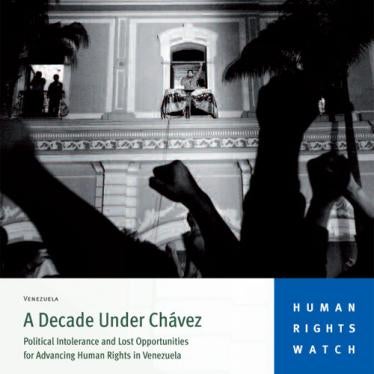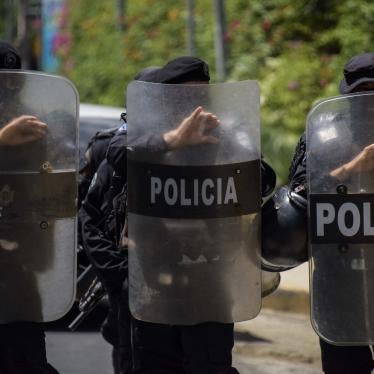(Washington, DC) - The Chávez government should immediately stop harassing a private television station that has been critical of the government and call off an unwarranted investigation into its conduct, Human Rights Watch said today.
In response to Globovisión's coverage of a May 4, 2009 earthquake, the National Telecommunications Commission (CONATEL) has opened an investigation into the station, citing quake coverage that "could generate alarm, fear, anxiety or panic in the population." Referring to the earthquake in a May 10 television and radio address, President Hugo Chávez publicly accused the private media of "inciting hate - even war," and warned them "not to make a mistake" because "they are playing with fire."
"The Chávez government is once again abusing its broad regulatory powers to harass its critics," said José Miguel Vivanco, Americas director at Human Rights Watch. "There is simply no justification for sanctioning a TV station for reporting on an earthquake."
On the morning of May 4, the privately owned Globovisión reported that an earthquake had struck near Caracas. After several unsuccessful attempts to obtain a response from the relevant government authorities, the broadcaster based its reporting about the magnitude and epicenter of the quake on information provided by the US Geological Survey. In the course of its coverage, Globovisión's director repeatedly urged viewers to stay calm and wait for official information from the government.
In response to Globovisión's coverage, the minister of interior and justice, Tarek El Aissami, said in an interview on state television that Globovisión's director "answers to the interests of the United States." In a news conference on May 16, Chávez warned, "We cannot allow the media to continue with their politics of terrorism."
CONATEL is investigating Globovisión for alleged infractions of the Law on Social Responsibility in Radio and Television, which was signed by Chávez government in 2004. Under the law, broadcast media can face suspension and ultimately revocation of their licenses for broadcasting material deemed to "promote, justify, or incite" war, breaches of public order, or crime.
As Human Rights Watch documented in its report, "A Decade Under Chávez", the broad and imprecise wording of the law, the severity of its penalties, and the fact that it is enforced by an executive branch agency all increase the broadcast media's vulnerability to arbitrary interference and pressure to engage in self-censorship. Venezuelan officials have repeatedly invoked these provisions in warnings issued to television stations at moments of political tension, and in circumstances in which their application would have been unjustified and hence an arbitrary interference in freedom of expression.
The Chávez government has also repeatedly abused its control of broadcasting frequencies to punish stations with overtly critical programming. In May 2007, for example, Radio Caracas Televisión (RCTV) lost its concession after Chávez announced at a nationally broadcast military ceremony the concession for RCTV would not be renewed because of its alleged support for an April 2002 coup. Neither this accusation nor an alleged breach of broadcasting standards was substantiated in a proceeding in which RCTV had an opportunity to present a defense. At the same time, the government renewed the concession of Venevisión, a rival channel that Chávez had also repeatedly accused of involvement in the coup but that had since cut its overtly anti-Chávez programming.
Globovisión, the only remaining channel on the public airwaves that continues to maintain an openly critical stance toward the Chávez government, is currently under investigation for two other instances in which it allegedly violated the Social Responsibility Law. In one instance, a guest commentator predicted that Chávez could "end up like Mussolini." In the second, Globovisión broadcast the victory speech of an opposition governor before the government had announced the election results.
"The threats by the Chávez government reveal the risk of abuse in such a vaguely worded law. As in the case of Globovisión, it can be used by the government at will to intimidate its critics," said Vivanco.






